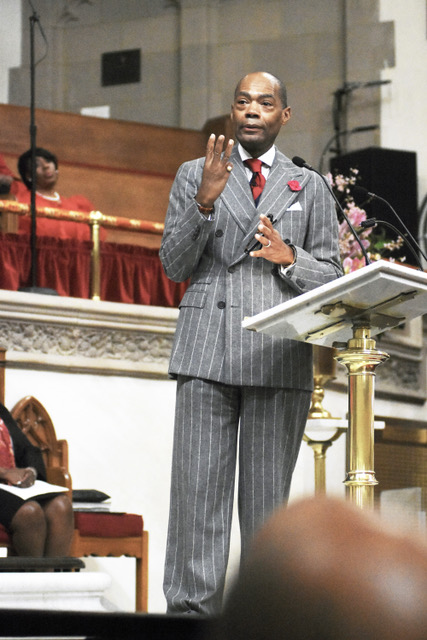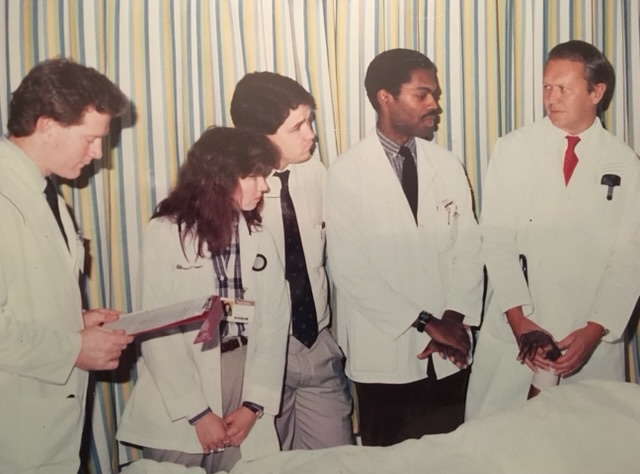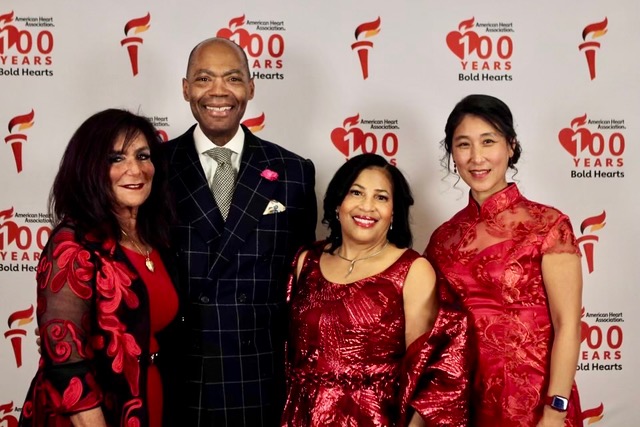Emory Heart & Vascular’s training programs have welcomed countless respected alumni over the years. One such legendary former resident is cardiologist and health care leader Keith Churchwell, MD, who is currently volunteer president-elect of the American Heart Association, a term that will go into effect this July.
A Tennessee native, Churchwell hails from a family of high achievers. His journalist father, Robert, became the first Black reporter at the Nashville Banner newspaper in 1950, his mother, Mary, raised five kids full-time and then taught for 30 years, and two of his brothers, including his identical twin, Kevin, are physicians. (Kevin Churchwell is also the current CEO of Boston Children's Hospital.)
Churchwell earned his undergraduate degree at Harvard University and his medical degree at Washington University School of Medicine in St. Louis. He then moved down to Atlanta for his residency at Emory School of Medicine, serving as chief resident at Grady Memorial Hospital from 1991-92.
In the three decades since, Churchwell has taught medicine and held top leadership roles at Vanderbilt Medical School and Yale New Haven Health System, among many other accomplishments.
Churchwell will pay a visit to his old stomping grounds at Emory on Monday, March 18, as invited speaker for the Division of Cardiology’s Grand Rounds. His presentation will focus on the ethnic and racial disparities in health care that were exacerbated during the pandemic — why these inequities persist, how these trends fit into the historic context of systemic racism in the U.S., and what diversity truly means in health care.
Ahead of this valuable discussion, we caught up with Churchwell to take a trip down memory lane, discuss the importance of mentorship in medicine, and explore how art and science are often intertwined.
Emory: What first made you want to go into medicine? Take me back.
Churchwell: The first time I thought about being a physician was in the ninth grade. We had a class on economics, and one of the assignments was writing about what type of professional role you wanted to take on when you grew up. Being a physician married a number of interests that were growing at the time — science and math and art and thinking about how to contribute to the community where I lived and breathed.
Emory: What's one thing that surprised you as you began to pursue cardiology?
Churchwell: What a great question. I had the unique opportunity and viewpoint of an older brother who was a cardiologist and had gone through this whole process, so I don't think I was surprised very much about what I came across or had to deal with. I was pleasantly not surprised, I guess. But it was great to find out that I really enjoyed the work.

Churchwell giving a Heart Month talk at Abyssinian Baptist Church in Harlem, NYC, in February this year.
Emory: You mentioned your brother, cardiologist Andre Churchwell, and I did have a question about that. I find it so interesting that you're both in the same field. You were both chief residents at Grady even. So, I must ask: Is there a sibling rivalry or any competitiveness between you two?
Churchwell: (Laughs) Oh no. He's eight years older. He thinks he's my father. There’s a healthy degree of respect for what he's been able to accomplish, and at least some degree of mentorship along the way.
Emory: You mentioned the mentoring relationship with your older brother, Andre. Can you talk about other key mentors you had early on in your career?
Churchwell: There were many mentors at Emory. A few that come immediately to mind are Drs. J. Willis Hurst, Robert Schlant, Wayne Alexander, Ken Walker, Randy Patterson. Truly incredible people, humble in their day-to-day lives, but remarkable people in terms of their abilities.
Another giant in my life was Dr. Nanette Wenger, who had oversight of the fellows during our clinic time and played such a huge role in cardiovascular medicine on the Grady campus. I had a wonderful chance to get to know her and be taught by her. She is someone I have looked up to throughout my whole my career.
Emory: Do you make time to connect with Dr. Wenger when you come back to visit?
Churchwell: Last time I was in Atlanta, it was actually for an event honoring her.
Emory: During your time at Emory, what were a couple top pieces of wisdom you learned, which you've carried on into the rest of your career?
Churchwell: The importance of not only understanding the science of medicine, but the true art of medicine in terms of the physical diagnosis and sitting down and learning how to talk to patients. A major part of your role as a physician is to be a true advocate for the patients that you take care of, joining them along the journey.
I was lucky that I had such a great cohort of people during my residency, of individuals that you really loved working with. The year I spent as chief resident at Grady was probably the most important year in my development, not only as a physician, but also ultimately as a health administrator. It was all about learning how to listen to people, understand people, and to start thinking about how to solve difficult problems.
Emory: You’ve mentioned the art of medicine a few times. I would love to hear you speak more on how you define that.
Churchwell: When I say art, I mean the evolving understanding of how to listen to patients and their families. I am a big believer that physicians follow in the great tradition of Sherlock Holmes. That we not only pay attention to the story, but also to the clues that surround the story, in someone’s clinical history, their work history, their family history. That's the true art. And it’s years of practice and an ongoing learning process.
Emory: As you’re describing this art form, to me it almost sounds like listening to a complicated piece of music and then being able to break it down into the different movements. I could see the metaphor getting drawn out that way, too.
Churchwell: It's funny you say that. One of my positions here (in Connecticut) is president of the New Haven Symphony Orchestra. When you're listening to any piece of music, from the American Songbook all the way through Beethoven or Stravinsky, one of the things you do to understand it is to go back and listen to it more than once. You listen to it over and over again so that you can pick out those nuances. Then you want to go back and understand the history of why the piece was written, because that gives you even a greater degree of understanding and a greater degree of enjoyment.

Churchwell, shown second from right, makes bedside rounds as a resident at Grady Memorial Hospital in 1988.
Emory: What is one of your favorite memories from your residency days?
Churchwell: Oh gosh. Well, I met my wife in my residency. I met my wife at the VA Hospital in Decatur in August of 1988. So, it's a great memory. I asked her to marry me about six weeks after we started dating and we’re still married now for 34 years this past January.
Emory: You’ve talked about the many legendary mentors you had coming up through Emory. What’s your own approach to mentoring, and what do you see as the biggest challenges facing up-and-coming doctors today?
Churchwell: I can’t tell you how many of young docs have come into my office with a basic question of, “How can I do what you've done?” Because they see being a senior clinician or administrator for these large organizations as something that they want do and they’d love to get there really fast. That’s when I tell them that, number one, I don't know of any special formula for instant success. It’s important to enjoy the journey that you are on, and it’s also okay not to know exactly what the future is going to entail or where you're actually going to land.
Emory: I imagine that that can be tough for early career doctors to take in sometimes.
Churchwell: Oh, it can be tough for all of us at the end of the day. But it’s okay. Take a deep breath and be true to yourself. Understand exactly why you got into the business in the first place and ensure that the path that you've taken is one that you personally enjoy.
Emory: What are some of the ways that you personally handle stress or unexpected hurdles in the road?
Churchwell: Oh gosh. Actually, I don't dislike stress. I really like sitting down and solving problems or working toward a new care path or a new program or tackling a significant issue. What I have a talent for is bringing individuals and groups together to resolve those issues.
One thing that has been very helpful in bringing to bear real solutions to problems I’ve encountered is ensuring that everyone around the room has a voice in the overall discussion. Many times, the voices that are very quiet, or feel at times inhibited by the room, may have the most spectacular ideas.
And there's where we miss a real opportunity to actually think about what the next steps are going to be. So, if anything, I get calmer at times in a stressful environment now.
Emory: Ok, final question. What is your all-time proudest moment?
Churchwell: My proudest moment is my daughter getting her master's degree from the University of Cambridge and now getting her PhD from Johns Hopkins. Seeing her take the opportunity to follow her dreams and then actuating on them makes me very proud.

At a Go Red Event in New Haven, Connecticut, in February.

